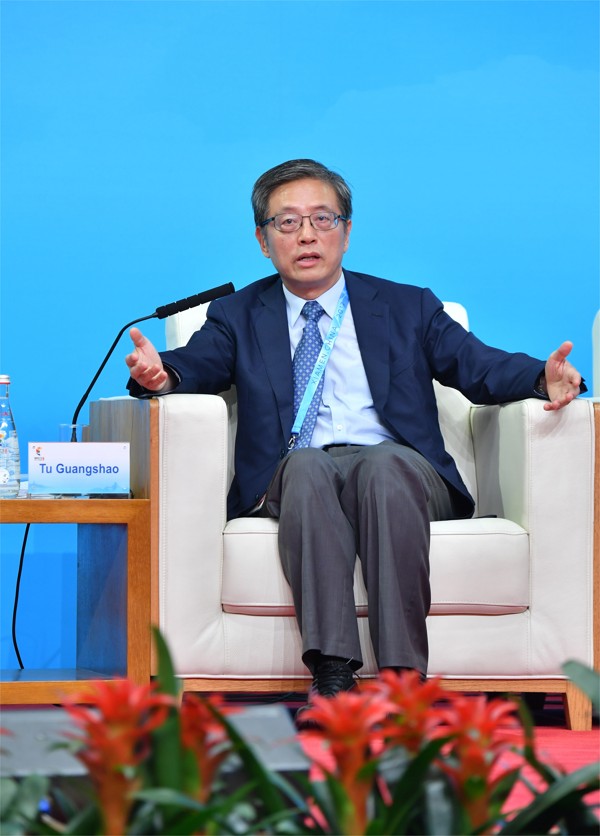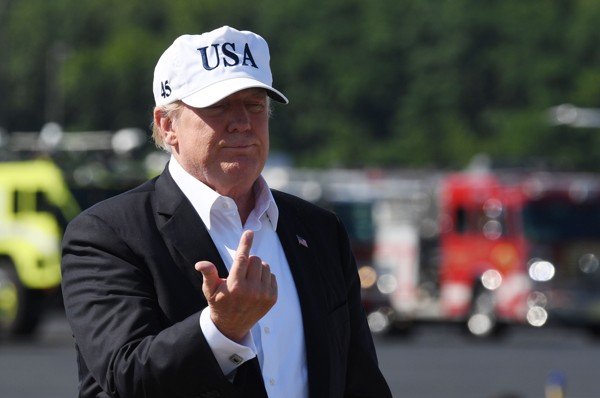
China’s sovereign wealth fund CIC wants more deals in US after top year for overseas investment
Fund’s chief says they hope Washington will continue to allow investments that will ‘benefit American corporations, employment and the economy’
China’s sovereign wealth fund on Monday said trade hostilities between Beijing and Washington would not stop it from pouring more cash into the US market after investments there helped it to a best-ever performance last year.
China Investment Corp (CIC), which was set up in 2007 by taking US$200 billion from the country’s foreign exchange reserves, had its top year for overseas investment in 2017, with an annual return of 17.6 per cent versus 6.2 per cent in 2016.
That was partly due to a US stock market boom – more than half of its stock holdings, which made up 43.6 per cent of its overseas portfolio, were shares in US firms at the end of last year.
Tu Guangshao, president of CIC, told a media briefing in Beijing that the fund hoped Washington would allow it to continue investing in US stocks and projects.
“As a long-term financial investor, our investments will benefit American corporations, employment and the economy,” Tu said, adding that US fears about threats from Chinese investments, especially from state-owned institutions, were “unnecessary”.
He said the fund was closely watching the trade war between China and the US.

Last year’s strong overseas investment performance has helped to lift the fund’s average annual returns to 5.94 per cent, allowing it to meet the target given by the Chinese government.
Tu made the remarks after tit-for-tat tariffs on US$34 billion of products from the world’s two largest economies took effect on Friday.
Meanwhile, Chinese investments are also under closer scrutiny, with the Committee on Foreign Investment in the United States (CFIUS) empowered by Washington to vet acquisition deals, particularly those in hi-tech areas.
China sovereign wealth fund CIC sells stake in Blackstone after 11-year investment
The US is traditionally a key market for the Chinese sovereign wealth fund, which manages a total of US$941 billion in assets. That includes high-profile investments in Blackstone and Morgan Stanley ahead of the 2008 global financial crisis – though it sold its stake in Blackstone earlier this year – and opening a representative office in New York last year.
“We hope to increase direct investment in the US. That’s why we set up the New York representative office,” Tu said. “China-US economic cooperation is an irresistible trend.”

The fund’s direct investment subsidiary, CIC Capital, lined up 20 projects last year involving total planned investment of US$3.8 billion. It also plans to expand into sectors like technology, media, telecoms, health care, consumer goods and advanced manufacturing.
Unlike other Chinese buyers, CIC has long branded itself as a financial investor, meaning it takes “less than 10 per cent stakes” and does not seek management control.
Ten years on, where to now for China’s sovereign wealth fund?
Initially on a mission to diversify China’s massive foreign exchange reserves, the fund has been met with suspicion in the US since it launched. When it took a 15 per cent stake in American power firm AES Corp in 2009, it came under a four-month investigation by the CFIUS before it was approved.
In an assessment report released in 2013, meanwhile, the US-China Economic and Security Review Commission said the Chinese fund had “pursued strategic objectives” and “maintains very close ties to the state”.
Tu said Chinese must explore new approaches to investment since “new challenges and uncertainties are emerging internationally”.

Chinese investment in the US fell to US$29 billion last year, from a record high of US$46 billion in 2016, according to New York-based research provider Rhodium Group.
The figure plunged 92 per cent in the first five months of 2017 from the previous year because of a “double policy punch” – Beijing cracking down on highly leveraged private investors and the CFIUS increasing scrutiny of Chinese acquisitions.
“The environment is different now. Even if many countries open their arms for investment, they also keep a lookout. We need to build a new image through new investment approaches, selection of partners and social responsibility fulfilment,” Tu said.
The sovereign wealth fund will also look to emerging markets for opportunities, particularly in countries involved in China’s “Belt and Road Initiative”, and set up more outbound investment platforms to “combine CIC investments with domestic economic development”.
Chinese officials tout ‘made in Vietnam’ zones on border amid trade row with US
In its high-profile acquisition of European logistics firm Logicor in November, CIC partnered with domestic equity partners to raise €12.3 billion (US$14.4 billion) of debt financing through a Chinese syndicate.
It also signed a memorandum of understanding with US investment bank Goldman Sachs that month to set up a US$5 billion manufacturing cooperation fund that will jointly invest in the American manufacturing, industrial, consumer goods and health care sectors.
The first phase of fundraising for that fund will close soon, Tu said, adding that the “preparation and fundraising process has progressed smoothly”.

